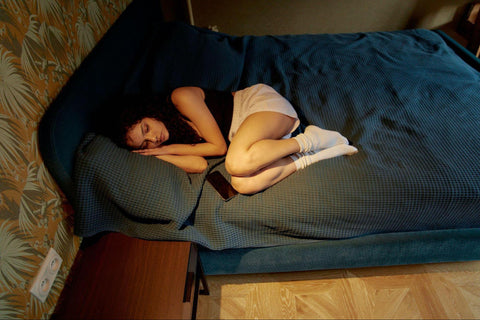In the world of athletics, recovery is often hailed as the unsung hero of consistent performance and improvement. While rigorous training regimes sculpt the body and hone skills, it's during periods of rest that the magic of muscle repair, growth, and memory consolidation truly happens. Central to this recuperation process is the role of sleep.
The intersection of sleep and recovery offers insights into how athletes can amplify their gains, prevent injuries, and optimize training outcomes. As you dive deeper, you'll discover science-backed strategies to maximize rest days and understand why sleep is the bedrock of athletic success. Keep reading to harness the transformative power of restful slumber.
Related Link: How to Lose Weight Fast: Speed Weight Loss
The Physiology of Sleep and Recovery
Understanding the Body's Natural Rhythms
Every living being functions on a circadian rhythm, an intrinsic clock that regulates various biological processes over a 24-hour period. This rhythm, especially pronounced in humans, governs the patterns of sleep and wakefulness. During our deep sleep phases, and notably the REM phase, there's a remarkable acceleration in the body's natural repair and recovery functions. This stage sees a surge in the release of the growth hormone, which plays a crucial role in muscle repair and growth. For athletes, sleep isn't just a passive activity; it's an active recovery phase. The deeper and longer the sleep, the more pronounced its benefits on recovery and overall athletic performance.
Sleep's Role in Cognitive and Physical Restoration
While the physical advantages of sleep, like muscle repair, are often discussed, its cognitive benefits are equally noteworthy. As athletes catch their z's, their brain is hard at work, processing the day's experiences, and consolidating memories - both cognitive and muscular. This consolidation is particularly vital when learning new techniques or strategies. Mastery, after all, is as much about repetition and practice as it is about rest and memory consolidation. On the physical side, quality sleep helps reduce systemic inflammation, bolsters the immune system, and balances hormones responsible for stress and recovery.
Ready to take your performance to the next level with performance-optimizing gummies? Check out HUMBLEROOTS today!
The Consequences of Skimping on Sleep
Diminishing Returns on Training
The relationship between training and rest is delicate. While it's tempting to believe that more training always equals better results, the lack of adequate rest can quickly negate those gains. Athletes operating on insufficient sleep often hit a performance wall, experiencing stagnation or even regression in their progress. The implications of chronic sleep deficiency are vast, ranging from a drop in aerobic output to decreased peak muscle strength, and protracted recovery periods. To put it succinctly, consistent inadequate sleep diminishes the returns on every training hour.
Increased Risk of Injuries and Illness
Our body's defense mechanisms, both against physical injuries and pathogens, are intricately tied to sleep. Chronic sleep deprivation weakens the immune response, rendering athletes more vulnerable to viral and bacterial infections. Simultaneously, the lack of rest makes the body and mind sluggish. This fatigue not only affects performance but also increases the risk of injuries. When operating below par, there's a greater likelihood of miscalculations, slower reflexes, and consequently, accidents during physical activities.
Strategies for Enhanced Sleep Quality
Regulating Your Sleep Environment
The surroundings in which one sleeps play an outsized role in determining sleep quality. It begins with the basics: a comfortable mattress tailored to one's sleeping position, pillows that support the neck and spine, and blackout curtains to create a dark environment conducive to sleep. But it goes beyond these physical elements. Electronic devices, with their blue light emissions, can interfere with the production of the sleep hormone, melatonin. By limiting screen exposure before bedtime, athletes can foster a more sleep-friendly environment.
Embracing Sleep-friendly Habits
Routine is at the heart of quality sleep. Going to bed and waking up at consistent times, irrespective of weekends or off-days, helps stabilize the body's internal circadian rhythm. Pre-sleep rituals, such as reading a book, practicing mindfulness meditation, or indulging in some calming music, can signal the body that it's time to wind down. And let's not forget the role of diet. Avoiding stimulants like caffeine or heavy, greasy meals a few hours before bedtime can make drifting off to sleep that much easier.
Related Link: Top 5 Natural Fat Burners
Utilizing Rest Days for Maximum Athletic Gains
Active Recovery vs. Complete Rest
Not all rest days are created equal. There's a difference between taking a complete break and engaging in active recovery. Gentle activities, whether it's a leisurely walk, some therapeutic yoga, or just simple stretching exercises, can enhance blood flow. Improved circulation aids in delivering vital nutrients to recovering muscles, facilitating quicker recovery. But listening to one's body is paramount. If signs of overwhelming fatigue persist, a day of complete rest might be in order.
Nutrition and Hydration on Rest Days
Athletes might not be burning as many calories on rest days, but nutrition remains paramount. These days are opportune moments to focus on recovery nutrition. Protein, for instance, is vital for muscle repair, while carbohydrates help replenish glycogen stores in muscles. Alongside nutrition, hydration plays a starring role. Water is instrumental in numerous metabolic processes, ensuring efficient muscle recovery and toxin elimination.
Rest, Recovery, and Rejuvenation

To truly understand athletic performance, one must recognize sleep as its silent partner. It's not merely the absence of activity but a potent form of active recovery. Ensuring restful nights isn't just about avoiding fatigue; it's about optimizing gains, mitigating risks, and setting oneself up for sustained athletic success. In the quest for peak performance, remember: rest isn't the final step; it's an integral part of the journey. So, embrace the power of sleep, rest up, and let your body perform its recovery magic!
Related Link: Push-up Variations: 10 Types of Push-Ups to Know




